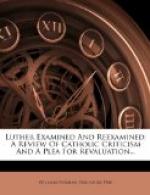Alexander VI, “the most depraved of all the Popes, likewise recognized no loftier aim than to heap honors and possessions upon his five illegitimate children, and among them especially his favorite, Caesar Borgia.” The nuptials celebrated for the Pope’s daughter Lucretia—who, by the way, was a divorcee—were “by no means peculiarly decorous.” The Latin chronicler who has related them reports in this connection that the moral state of the clergy at Rome was indescribably low. The example of the Popes had set the pace for the rest. From the highest to the lowest each priest had his concubine as a substitute for married life ("concubinas in figura matrimonii"), and that, quite openly. The good chronicler remarks: “If God does not provide a restraint, this corruption will pass on to the monks and the religious orders; however, the monasteries of the city are nearly all become brothels already, and no one raises his voice against it.” Wading through the mephitic rottenness of these ancient chronicles, one is seized with nausea.
Holy things, religious privileges, had become merchandise with which the Popes trafficked. The chronicler Burchardus relates: “In those days the following couplet was sung in nearly the whole Christian world:
“Vendit Alexander
claves, Altaria, Christum,
Emerat ista prius, vendere
juste potest.”
The meaning of this satire is: Alexander sells the power of the keys of heaven, the right to officiate at the altar, yea, Christ Himself; he had first bought these things himself, therefore he has a right to sell them again. Unblushing perfidy was practised by this Pope in his dealings with kings who were his religious subjects. In a quarrel with Charles VIII of France he threatened the king with excommunication, and sought aid from the Turkish Sultan. “However, when Charles appeared in Rome, the Pope went over to his side immediately, and delivered up to him Prince Dschem; but he took care to have him poisoned immediately, that he might not lose the price set upon his head by the Sultan.” Thus he conciliated the French monarch and filled his purse by one and the same act. “By traffic in benefices, sale of indulgences, exercise of the right of spoils, and taxes for the Turkish war, as well as by the murder of rich or troublesome persons, Alexander was seeking to scrape together as much money as possible to support the wanton luxury and shameful licentiousness of his court, and provide treasures for his children.” In their correspondence men who had dealings with him would refer to him in such terms as these: “That monstrous head—that infamous beast!” ("Hoc monstruoso capite—hac infami belua!")
“At length the poison which the Pope had meant for a rich cardinal, in order to make himself master of his wealth, brought upon himself well-deserved death.” The Pope’s butler had been bribed and exchanged the poison-cup intended for the Pope’s victim for the Pope’s cup, and the Pope took his own medicine.




